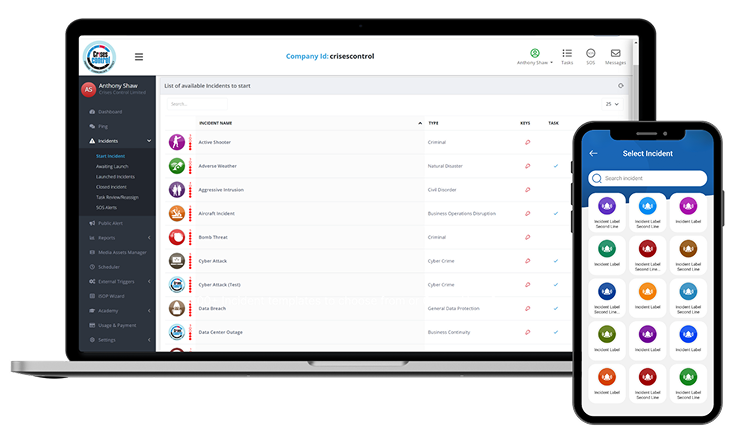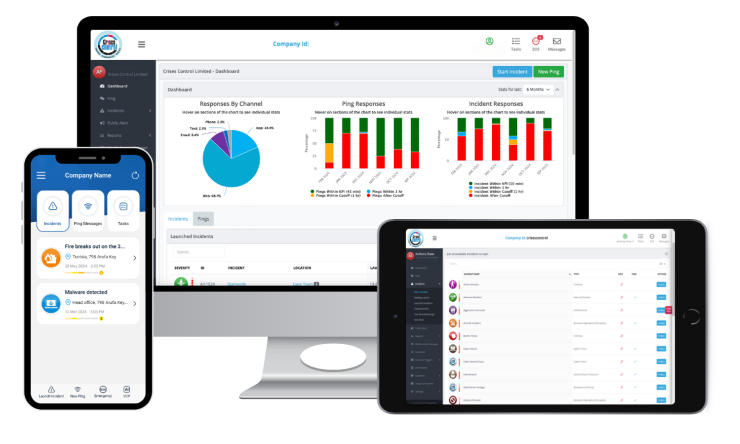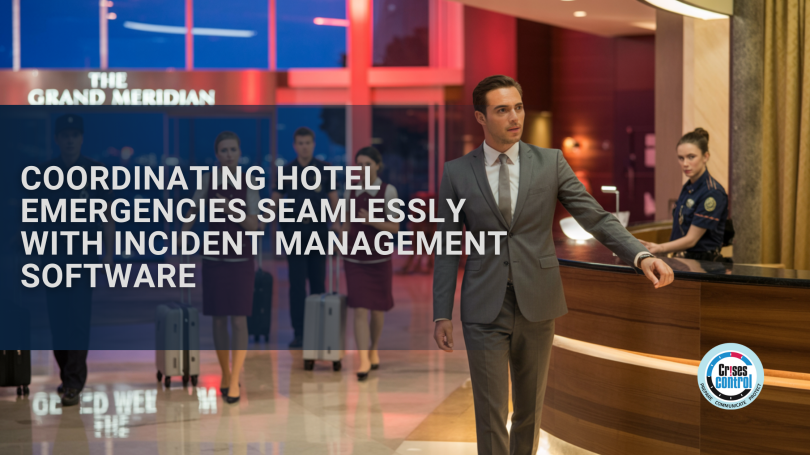Written by Anneri Fourie | Crises Control Executive
Incident management software is essential for hotels, which run around the clock with hundreds of guests, multiple teams of staff, and complex facilities that never stand still. From kitchens and housekeeping to events, gyms, and guest rooms, so many moving parts make hotels difficult to manage in normal circumstances. When something goes wrong, things can spiral quickly.
Imagine a fire alarm sounding in the middle of the night. Guests are half asleep, staff are scattered across the property, and the duty manager has to coordinate everything in seconds. Or picture a cyberattack that locks the booking system on a Saturday afternoon with a wedding party arriving. Without a clear way to manage these incidents, the response often becomes chaotic. Guests panic, staff scramble for instructions, and managers lose precious time trying to piece together what is happening.
This is why hotels need more than just fast communication. They need structure, visibility, and a reliable way to coordinate tasks under pressure. This is exactly what incident management software provides. Crises Control Incident Manager gives hotels a way to manage emergencies step by step, helping staff work together while managers maintain control. The result is quicker responses, safer guests, and smoother recovery.
Why Hotels Need Incident Management Software
Hotels are not simple workplaces. They combine public areas like lobbies and restaurants with private rooms, kitchens, ballrooms, and leisure spaces, often spread across large sites. This complexity means emergencies rarely follow a single script.
Some of the key challenges include:
- Guests unfamiliar with safety procedures. Visitors often have no idea about fire exits or how to respond during emergencies.
- Staff dispersed across the site. Housekeepers may be on different floors, kitchen staff underground, and maintenance teams working outdoors, making it hard to reach everyone quickly.
- Fast-moving situations. Fires, violent incidents, or IT outages demand instant action, often before emergency services can take over.
- Reputation on the line. A poorly handled incident spreads quickly on social media and can damage bookings for months.
Traditional approaches such as calling trees, group texts, or paper-based plans are simply too slow. By the time information reaches everyone, the situation may already be out of control. Incident management software replaces this uncertainty with clarity, giving managers full oversight and the tools to make informed decisions.
How Incident Manager Works for Hospitality
Crises Control Incident Manager has been built to take the pressure out of chaotic situations. Instead of leaving staff to improvise, it provides clear instructions and tools to keep everyone aligned.
Centralised Command
During a crisis, information flows into one platform. Managers see what has happened, who has been notified, and which actions are still pending. This reduces duplication, avoids crossed wires, and makes it easier to stay in control.
Task Management
Emergencies are rarely one-dimensional. While one team is helping guests evacuate, another might need to contact the fire brigade, while IT locks down systems. With Incident Manager, tasks are assigned directly to individuals or teams, progress is tracked, and managers can see instantly if something is being missed.
Real-Time Updates
Emergencies shift quickly. A fire may move to another floor, or a power outage might spread across the site. Incident Manager provides real-time updates so managers know what is happening as it unfolds. This allows them to adapt instructions and keep everyone safe.
Templates and Playbooks
Every second matters in a crisis. Instead of writing instructions from scratch, managers can trigger pre-prepared playbooks tailored to different scenarios such as fires, floods, cyber incidents, or violent threats. These ensure responses are consistent, fast, and accurate.
Reporting and Audit Trails
Everything that happens is recorded automatically. From who received alerts to which tasks were completed and when, managers gain a clear record that supports compliance checks, insurance claims, and lessons learned reviews.
Key Risks for Hotels and the Role of Incident Manager
Active Threats
Hotels sometimes face violent guests or even armed intrusions. Staff need protection and guests need guidance. Incident Manager helps by ensuring lockdown steps are followed, staff are directed safely, and updates are shared with law enforcement.
Fires and Safety Incidents
Fire is one of the most serious threats in hospitality. Swift, structured evacuation is essential. Incident Manager supports managers in assigning evacuation tasks, tracking responses, and keeping accurate headcounts in real time.
Health Crises and Food Safety
Pandemics and outbreaks of foodborne illness are major risks for hotels. With Incident Manager, health protocols can be activated instantly. Tasks go to cleaning staff, kitchen teams, and management so there is no confusion about who should do what.
Utility Failures
A power cut during a wedding or a burst water main on a busy evening can cause chaos. Incident Manager allows engineers, front desk, and guest services to be mobilised at once, keeping disruptions under control and guests informed.
Cybersecurity Incidents
Hotels handle sensitive personal and payment data, making them common cybercrime targets. If a ransomware attack hits, managers must coordinate IT recovery, protect data, and meet reporting obligations. Incident Manager provides the structured workflow needed for this.

Interested in our Incident Management Software?
Launch and manage incidents in seconds with real-time dashboards, task management, multi-channel alerts, and mobile access for seamless response.
Compliance Made Easier
Hotels must meet a wide range of regulatory standards across safety, health, and data protection. Managers often describe compliance as one of their biggest headaches, especially during inspections or audits. Without proper records, it is easy to fall short.
Incident Manager supports compliance by:
- Recording every incident, drill, and response automatically
- Providing audit-ready evidence for regulators and insurers
- Demonstrating that staff follow the right procedures in real time
- Keeping guest data secure in line with privacy laws
For example, UK hotels must meet fire safety orders and GDPR, while EU hotels face strict food hygiene and health and safety directives. In North America, OSHA, ADA, and PIPEDA all apply. By maintaining a complete digital record, Incident Manager makes compliance simpler and less stressful.
Learning from Real Incidents
Events in recent years show how quickly hotels can be thrown into crisis:
- Storm Babet flooding in the UK (2023). Hotels had to evacuate guests and protect operations. Incident Manager would have supported rapid task allocation and guest safety tracking.
- Ransomware attack on a US hotel chain (2023). Guest data was stolen and booking systems locked. A structured response platform could have reduced downtime and improved secure communication.
- Armed robbery at a Middle Eastern resort. Staff needed immediate coordination to protect guests while working with local authorities. Incident Manager would have ensured instructions were clear and tasks completed.
- E. coli outbreak in a European hotel restaurant. Health teams and regulators demanded instant information. Incident Manager could have provided structured task management for cleaning, guest notifications, and compliance reporting.
Each of these examples shows how confusion and delay can make crises worse, and how structured coordination could have brought clarity and control.
Everyday Benefits Beyond Emergencies
Although built for emergencies, Incident Manager supports day-to-day hotel operations too.
- Routine maintenance. Tasks like fixing air conditioning units or broken lifts can be assigned, tracked, and closed without long email chains.
- Event management. Large weddings or conferences often require coordination across multiple departments. Incident Manager keeps everyone aligned.
- Training and drills. Compliance requires regular practice. Incident Manager makes drills easy to plan, run, and record.
- Operational disruptions. Staff shortages or transport delays can be managed by reallocating tasks and notifying teams instantly.
These everyday uses mean the software adds value long before a major incident ever occurs.
Why Choose Crises Control Incident Manager
When looking at incident management software for hotels, Crises Control stands out for several reasons:
- A simple, intuitive design that staff can learn quickly
- Real-time oversight for managers during crises
- Playbooks tailored to hotel-specific risks
- Secure infrastructure that supports international data protection standards
- Scalability to suit both boutique hotels and international chains
The result is a platform that improves resilience, protects staff and guests, and helps hotels recover faster.
Take the Next Step
No hotel can stop incidents from happening, but managers can decide how well they respond. With Crises Control Incident Manager, hotels gain the tools to assign tasks quickly, track progress, and keep both staff and guests safe.
Contact us today and arrange your free demo. See how it can help your hotel strengthen safety, compliance, and guest confidence.
Request a FREE Demo

